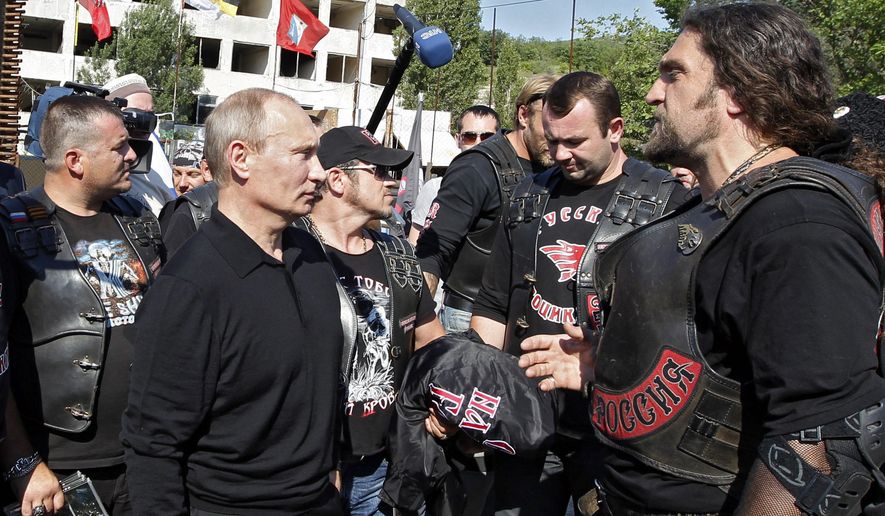MOSCOW — From shady dictators to shadowy Ukrainian separatists, Russian President Vladimir Putin has attracted some unusual allies. The Night Wolves, a Kremlin-funded, leather-clad, heavily tattooed motorcycle gang, are right up there with the strangest.
A key element in Mr. Putin’s domestic political firewall, the 5,000-strong Night Wolves gang made international headlines last month as dozens of its bikers attempted to follow the 3,700-mile path of the Red Army across Eastern Europe to Berlin to mark the 70th anniversary of Russia’s victory in what is known as the Great Patriotic War. The vast majority of the bikers, many with Soviet flags tied to their bikes, were forced to turn back after they were refused entry into Poland and Lithuania.
Wolves’ leader Alexander Zaldostanov, also known as The Surgeon, said in an interview that the incident proves there is “no democracy” in “Satanic Europe.”
The muscular Mr. Zaldostanov, a former physician, also has no doubts about the ultimate U.S. and European goal for his country.
“The West is seeking to destroy Russia,” he told The Washington Times. “But we will defend our homeland from anyone who wishes it harm.”
As relations between the United States and Russia have plunged to a post-Cold War low over the crisis in Ukraine, Mr. Zaldostanov’s high-profile motorcycle club has become the public face of the Kremlin’s attempts to defeat what it sees as a Washington-led project to provoke a popular revolt in Russia.
The Night Wolves are a key part of the Anti-Maidan coalition, a pro-Putin movement whose members have pledged to quash any attempt to establish an opposition protest camp in Moscow. The group takes its name from the Maidan demonstrations in central Kiev, which led to the overthrow of Ukraine’s pro-Moscow president, Viktor Yanukovych, in February 2014. Mr. Putin said the United States orchestrated and financed those protests as part of a plan to weaken Russia.
“The Night Wolves are one of the groups that the Kremlin likes to keep around just in case of trouble,” said Marina Litvinovich, a political analyst. “These groups could become very important for the Kremlin if there are large protests after either the 2016 parliamentary polls or the 2018 presidential elections in Russia, [protests] which will be labeled part of a Western plot by the authorities.”
Mr. Zaldostanov, who sports a double lightning bolt tattoo on his neck, acknowledges that the Night Wolves have received some $1 million in state funding over the past 18 months. Some of this money has been used to stage shows that teach Russian children to fear and hate the West.
Anti-American attitudes have rocketed in Russia over the past year. Some 80 percent of Russians profess negative feelings toward the United States in opinion polls.
“Russia must be deprived of freedom,” a villainous American character shrieked at a recent show staged by the Night Wolves. “Those who do not agree must die.”
In another show, Russia’s Snow Maidan, a favorite festive season character, is kidnapped by evildoers from “across the ocean.”
“We are not doing this for the money,” Mr. Zaldostanov said. “We would promote patriotism and Russian traditional values for free.”
In a sign of his approval of the gang, Mr. Putin has ridden a three-wheeled Harley-Davidson with the Night Wolves through the streets of Russian cities on a number of occasions. He also has awarded Mr. Zaldostanov, 52, state honors for his “patriotic work.”
Mr. Putin’s small but defiant political opposition has been scathing in its assessment of the Night Wolves.
“The Night Wolves and many pro-Putin groups like them are not true people’s movements,” said Mark Galperin, an opposition activist. “They couldn’t operate without the protection of the police and the security services. When push comes to shove, they will not stick their necks out for Putin.”
Armed members of the Night Wolves, including Mr. Zaladantsov, participated in Russia’s March 2014 seizure of Crimea. Last month, Ukraine charged Mr. Zaladantsov with financing pro-Russia rebels who carved out two “people’s republics” in the east of the former Soviet republic. The Night Wolves leader laughed off the accusations.
Formed in final years of the Soviet Union, the Night Wolves began as a virulently anti-communist gang.
Russian President Boris Yeltsin even honored Mr. Zaladantsov for his part in preventing a KGB coup in 1991. This fact sits uneasily with his current undisguised admiration of Soviet dictator Josef Stalin.
“I was naive back then,” Mr. Zaldostanov said. “This medal means nothing to me now.”
The Night Wolves’ leader is also keen to stress his devotion to the powerful Russian Orthodox Church, which has grown increasingly close to the Kremlin since anti-Putin protests rocked Russia in 2011 and 2012.
Mr. Zaldostanov rejects suggestions, however, that his admiration of Stalin, under whose rule millions of believers were killed or sent to the gulag, is incompatible with what he says is a deep Christian faith.
“Anyone who says Stalin killed millions is talking rubbish,” Mr. Zaldostanov snapped. “The world will never understand Stalin. Even though he has been dead for decades, he still frightens the West.”
He also dismissed as “lies” countless archive execution orders signed by the Soviet dictator that researchers have unearthed.
He may be an avowed enemy of the U.S. government, but Mr. Zaldostanov sees no contradiction in his passion for bike gangs, whose roots are firmly in American subculture.
“I’m a fan of American culture,” he said. “I love lots of American films, especially ’Mad Max.’ I have nothing against the American people.”




Please read our comment policy before commenting.